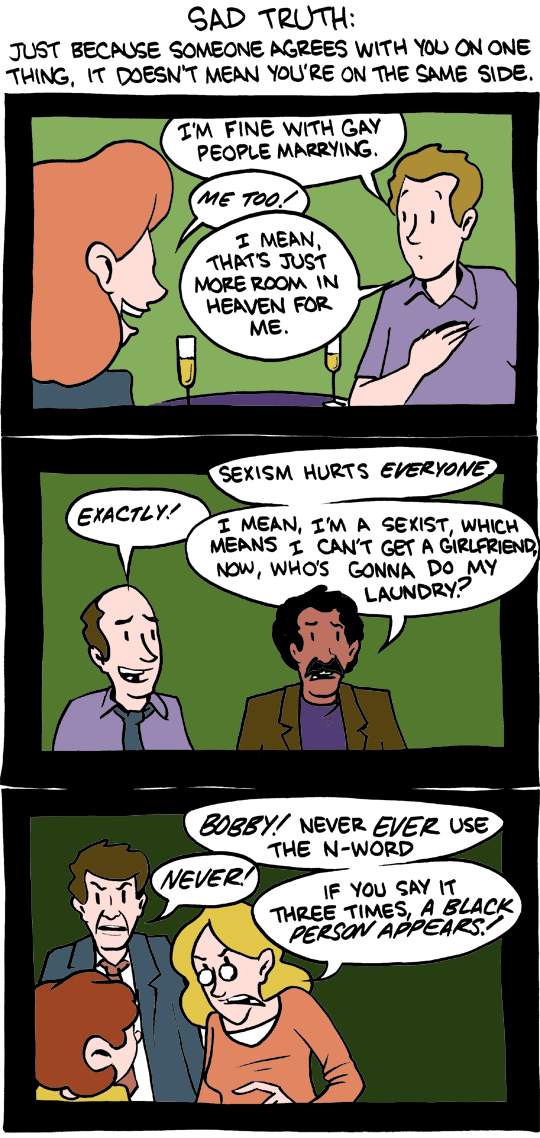Here, in the glorious piece of work below, we argue for the radicality of something outside of our core texts as it relates to the themes in our class. Lovely.
It Almost Doesn’t Exist
There is perhaps nothing new under the sun, particularly in the romance genre. Hell, we have a textbook with a chapter devoted to the concept “boy meets girl, boy loses girl, boy gets girl in the end.” It takes a little digging to find something truly “radical,” something that challenges genre and brings something new to light. I submit to you the short film “Run,” a new video from Cut to the Chase Productions, a film company that brings new media to light.
go there. be informed
The tagline of “Run” is that it is a film “exploring lost love and the impossible decisions we make” (cuttothechasefilms.com). It certainly does. It’s a story that starts long after “boy loses girl” – the boy in question has been away for a year, presumably doing something shady to get a large amount of money. Boy and girl leave town, but circumstances destroy what they have together (as they tend to do).
What I like about “Run” is that the characters are flawed people. The boy deals with the wrong sort and suffers consequences for his actions. Not that I buy into the convention that every single person who does something questionable should have to answer for it, but it does add some dramatic tension. The couple does not get to have a romantic reunion at an airport after a hilarious misunderstanding. There is loss, heartache, impassioned fighting.
Is the film “radical,” though? There is a moment in the film where the boy states: “We have money now; we can do whatever we want.” Baudrillard would be proud. The boy hopes to win the favor of the girl with money – he has not physically or emotionally been there for her in a time of need, and so hopes this will do the trick. In a way, it does. In a departure from many films of this nature, they impulsively pack their things and decide to do what they can to build a new life outside of town. They feel secure in that their money can get them what they need – maybe new identities, maybe just security and safety.
Baudrillard quotes Dr. Dichter in “The System of Objects” as saying “One of the fundamental problems of prosperity is to sanction and to justify its enjoyment, to convince people that making their life enjoyable is moral, and not immoral.” This is something that doesn’t come up in fiction a whole lot – characters attempting to enjoy their wealth when they have it. I should say it’s something that doesn’t come up and last for long periods of time, or is given positive light as an option, rather than throwing everything to the wind and attempt to live on something like pure romance. This couple’s second go-‘round begins on a painfully practical ground. Here are two people who sink into the belief of “If we have the means, we can do what we want – the consequences we can deal with later.” Certainly radical in and out of itself.
There are moments where the film falls prey to the traps of the romantic genre – the couple is fighting but out of their passionate shouting at each other there emerges a moment where they kiss, and the kiss solves it all for the couple. Once they kiss they make up, decide to get back together, maybe even fall back in love. It’s a cliché, surely; a kiss cannot solve a problem, at least not long term. That would have to be one hell of a kiss.
 |
| THIS caliber of kiss |
Can a couple live on love alone? According to various credible sources, all you need is love. The Beatles didn’t write a song called “All You Need is Love, A Place to Live, and Steady Income.” It isn’t a romantic thing to think about, and certainly not uplifting to watch. I’m just riffing now, but I daresay we’ve overly romanticized living without material comfort. Adam Smith probably never had a stable, loving relationship in his life, but he certainly got to understand what drives us. In the introduction to “The Politics of Culture,” Rivkin and Ryan make a true and interesting point when the say “the media inevitably further attitudes and perceptions that assure its continuation.” We keep buying into movies because we have been conditioned to; if an esteemed filmmaker says love is all you need to get by, then who are we to disagree? It trickles down and seeps into our collective consciousness.
I don’t hate romance or the concept of it. There are always other things to consider in a relationship. Not to take my raging diatribe down to a bland vanilla simmer, but you can’t live on just one thing just as you can’t live trying to do without love or passion in a relationship. The media has a firm hold on what we believe to be good and healthy in a relationship. All I know is that if it starts raining outside, it’s the perfect time to call any estranged ex-girlfriend and attempt to make up. It’s practically guaranteed that I’ll get a kiss.
Works Cited
Baudrillard, Jean. The System of Objects. Excerpt, Ch. 9.
www.cuttothechasefilms.com
Rivkin and Ryan. The Politics of Culture. Excerpt, Ch. 1.
seriously, go there and spend 18 minutes of your life watching this film. maybe you'll even see some of the things I saw.









